- Sister Beatrice and the Church (Part 1)
- Sister Beatrice and the Church (Part 2)
- Sister Beatrice And The Church (Part 3)
Content warning: mentions of homophobia, mentions of abuse
Spoiler alert for all of season1 of Warrior Nun.
Welcome back to a Sister Beatrice analysis where I attempt to examine Beatrice’s relationship with the Church. In Part 1 I took a look at the dogmas that might have influence her point of view, positing that her vows are a form of penance for the perceived sin of her queerness. This time, I want to focus on how Ava influences that, and how Beatrice can break free of the cycle of guilt, like I suspect (and hope) she’s bound to do.
I believe that Ava is a major factor to Beatrice reaching true self-acceptance. I like Avatrice as much as the next gal, but I’m not here to argue that the attraction that was hinted in the back-end of season 1 is just going to rock Beatrice’s world enough for her to break it. I think it is more nuanced than that. Plus, this analysis is through the lens of Catholic dogma, and how that potentially applies to Beatrice’s relationship the Church and her sexuality.
Ava challenges Beatrice’s position before they make googly eyes at each other. And it is the way Ava is, and the way she sees herself that most affects Beatrice. Let me explain.
Before I get going, I warn that it is a necessity to have read Part 1, as the following analysis depends on accepting the reading presented there.
Beatrice’s Selfishness (?)
As mentioned last time, guilt is built into the Catechism of the Church. Every person is a sinner by nature, and must rely on the Church for constant forgiveness, and guidance about how to say on the right path.
But what is the right path? This is something that Warrior Nun addresses a bit more directly, in the form or purpose. In Catholicism, purpose comes from God, and the prevalent idea that there is a plan and a calling for everyone. When trying to convince Ava to join their cause after her unintended resuscitation, Vincent and Mary talk about purpose.
It is is what drives every member of the OCS, albeit in different ways. Lilith believes it’s her purpose to be the next halo-bearer, for example. Mary’s found hers in helping people and her found family, as demonstrated in 1×06. Vincent’s found a darker calling, but it’s safe to assume he believes what he’s doing has a higher purpose.
I posited that for Beatrice, the calling to take vows started to “save [her] immortal soul”. Even though she later found a worthy cause with the OCS, she expresses this to be the principal motivator of her actions. She puts it forward when Mary accuses her of caring more about the Church than her sisters, when she’s willing to follow Duretti’s orders even though it’s looking like he had Shannon killed.
If you stop to think about this in the context of season one, this is… kind of selfish?
There are little clues you can find that Beatrice follows orders even when she’s weary of the moral implications. Beatrice is smart, she knows when something is not right, but she follows through. To feel reassured. To save herself.
It would be reductive to simply call her selfish and completely condemn her. Religious indoctrination can be tough, and according to Marlene Winell’s article on Religious Trauma Syndrome (RTS), it can constitute a cycle of abuse. It is very curious however, that selfish – expressed as self-centered – is the accusation she throws at Ava.
Though hypocritical, I don’t believe Beatrice is being necessarily malicious. Rather, I believe she is projecting her own religious guilt onto Ava.
In her series about Warrior Nun and trauma, Taylor said: “[Mary and Beatrice’s] characterization of her as ‘selfish’ and ‘self-centered’ reflects their background in an institution that expects women to sacrifice themselves, body and soul.” I think this hits the nail in the head.
Projecting Guilt and Spite
Ava: “I’m not a warrior and definitely not a nun. This whole place, everything, it just isn’t me.”
Beatrice: “It wasn’t me either, not at first. We all have a past, Ava, secrets that are ours alone. But none of that matters when you realize that not everything is about you.”
One of the most common arguments against forgiving student debt comes from people who’ve paid off their dues. “Why should they get it handed to them when I had to suffer? If I had to pay, they have to pay, too,” many say. Instead of wanting to spare future generations suffering, they expect to see them endure it, and even revel in it. This frame of mind is spiteful, even a little vengeful. Students don’t deserve to be on the receiving end of that, of course, but the people who feel this way are powerless against a system that does, or did at one point, oppress them.
That scene with Beatrice and Ava in 1×03 reads to me as a very subtle version of that. Beatrice is seeing Ava through the lens of the Church, the same one that once judged her so harshly. Her judgement of Ava as selfish and her suggestion that she should basically get over herself, because everyone else has had to…that’s spite. The way Beatrice treats Ava in 1×03 is almost punitive. Yes, she was much kinder than Lilith and Mother Superion, but she’s communicating the same thing they are.
Ava might not directly fight Beatrice in that moment, but she mulls everything over and eventually bails, thus indirectly, she does end up challenging her.The next time she sees Ava, Beatrice lets he walk free, actively ignoring direct orders for the first time.
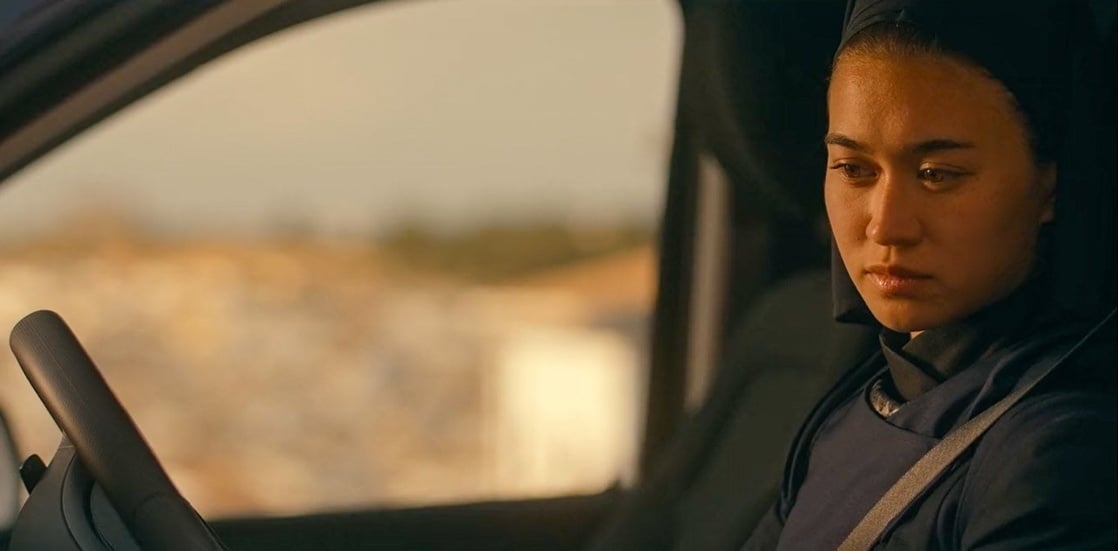
At the core of it, Ava represents an antithesis to Beatrice’s entire worldview. Not only do I think this is a stronger factor than her eventual attraction to Ava, I think it is a major factor in why she is attracted to her in the first place.
The Ava Factor
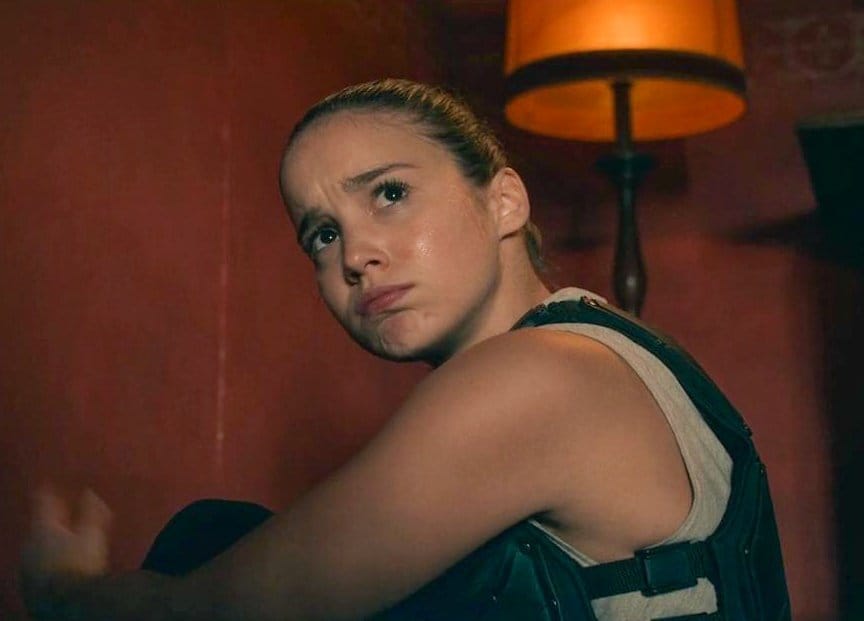
Ava Silva is the protagonist of Warrior Nun. She is a certified Glorious Dumbass, a human golden-retriever, and the survivor of unimaginable abuse and pain.
Paralyzed in an accident that killed her mother and left her destitute, Ava got stuck in a bed inside a hostile orphanage in a foreign country for twelve years. Her caretaker abused and ultimately murdered her. She woke up in a morgue with a new lease on life, but soon found out it was, in fact, a lease, and the proverbial “property owners” – the order in charge of the Halo used to resurrect her – expected her to give herself to their cause.
Father Vincent, leader of the OCS, learns about her and her life early on in the season. We can’t be sure if he knows she was murdered, but he certainly knows about the accident, the paralysis, and the conditions of the orphanage she lived in.
It’s interesting that Vincent is the one who more fiercely argues for her right to live to those who would prioritize the halo (Lilith, Mother Superion, the Cardinal). Yet the life he offers to defend is not for Ava to live freely, but for her to give herself to the “higher purpose” of the OCS – at least that’s what he tells Ava, the truth is he probably thinks he can more easily manipulate her into freeing Adriel.
Catholicism teaches that God has a plan for everyone, and that whatever suffering you endure will be redemptive. Independent of anyone’s opinion about this belief, it’s hard to imagine someone like Ava being receptive to it.
After all, what did 7-year-old Ava need to be redeemed for, by submitting her to such pain, by enduring such abuse? And from the same organization offering the proverbial redemption, no less.
Beatrice has taken the “pain is redemption” pill. Then, projecting onto Ava, offers her the same “medicine”. It’s the same thing Vincent, Lilith and Mother Superion have offered, just with different presentations. Beatrice does offer a significant amount more empathy than the rest. Still, Ava does not take it.
Vincent: (Referring to Areala and Ava) “You were both chosen for a greater purpose.”
Ava: “If by chosen you mean someone shoved something into our bodies without permission and then was like, ‘oh, by the way this is your life now.’ Then for all we know Areala never wanted this.”
1×03
Beatrice, entrenched in the Church, has long embraced the pain as her redemption for what she has been taught to believe are her mistakes. This follows directly from the theory I propose that she’s in penance. By definition, penance is self-punishment.
“When you’re punished just for being different you begin to hate what you are. And what you love, what should make you happy, only brings you pain. Pain is what made me a Sister Warrior”
-Beatrice to Ava, 1×08
Following that train of thought, I think there is a fair amount of evidence to suggest Beatrice believes she deserves whatever pain this penance brings her.
“We all have a past, Ava, secrets that are ours alone. But none of that matters once you realize that not everything is about you,” she tells Ava on their first conversation. “You need to break through your own personal pain,” she says later, when she’s training Ava to phase into the tomb.
In both these instances, I don’t believe Beatrice is talking about Ava exclusively. She herself has done this. She doesn’t expect from Ava any less than she’s done herself. Yet it’s completely unfair.
First of all, what does Beatrice know of Ava’s pain, really? Even not knowing about her murder, the loss of her mother, her mobility and her life should be enough to make Beatrice mince her words. But she’s still seeing Ava through the lens she sees herself. Through the lens of the Church, and, perhaps, of her parents.
A reading of Ava’s journey through a Catholic lens, and even through a classic Chosen One’s narrative, would suggest that she lived through all the pain so that she could end up in that morgue, and become the vessel for the halo, the next in a long list of women who’ve died for the cause. Ava rejects this. She refuses to accept the purpose that others have assigned to her pain at face value. This is because Ava knows, intuitively, that pain and suffering are often senseless, arbitrary, and most of all, unfair.
What happened to Ava was unjust, and senseless. Ava knows this. But so is what happened to Beatrice, who does not. That is the most important thing that Beatrice has to learn from Ava. By learning to see Ava, and understand her, she can begin to unravel her outlook on her own pain, and her penance.
Beatrice is not there yet, though. As late as episode 9, she prepares a contingency plan in case Ava bails.
Beatrice: “Being a team player isn’t exactly your forte. You do what’s best for Ava. Flight, not fight, that’s where your instincts are.”
Ava: “Okay, fair. But things change when you realize not everything’s about you.”
1×09
By this point Beatrice’s view of Ava has shifted slightly. Where before she’d seen her as purely self-centered, there is a recognition here that that’s not inherently bad. An acceptance of Ava’s instincts as fact, but not used to condemn or chastise her.
Yet, Beatrice still doesn’t understand what makes Ava tick, not really. Because Ava was never a selfish person. She went into a dark alley following a wraith demon before she even understood how the halo worked. She’s not opposed to danger in order to help others. It’s just that Ava’s still-forming sense of purpose doesn’t come from a divine plan or an authority figure’s agenda, but from her own sense of right and wrong, which Ava trusts.
Ava is still learning a lot of things, but she trusts herself implicitly. When she’s unsure, she leaves the situation. She goes back to the OCS – to Mary – only when she’s exhausted every possibility. When she joins in with the Sister Warriors, she might not be sure of what she’s capable of, but she’s secure in her decision. I’m not certain the same can be said of Beatrice.
As a quintessential Dutiful Princess, Beatrice is still duty-bound. Upon leaving the Church, she latches herself onto Ava and the mission at hand as her new duty. I’m still not entirely sure Beatrice is following her own, unadulterated conviction.
It think it’s safe to say that Ava does learn from Beatrice, too. Her suggesting that she realized “not everything is about [her]” in 1×09 is sincere. Since episode 6, Ava has tried to turn a blind eye to the genuine plight of the people she could help as the Warrior Nun. It’s extremely understandable, and frankly if she had chosen to run, I would have supported her 100%. But Ava’s not like that, not really. Ultimately, the cause they’re fighting for is bigger than her. To ignore that calling would mean not being true to herself.
What makes Ava and Beatrice special together is that they complement each other, and each needs to learn crucial lessons from the other.
Beatrice is still unable to see Ava without her vision clouded by her outlook on duty, and the dogma she’s lived her life by. Getting there will not be easy, and it will require owning up to real mistakes she’s made.
Beatrice’s True Redemption
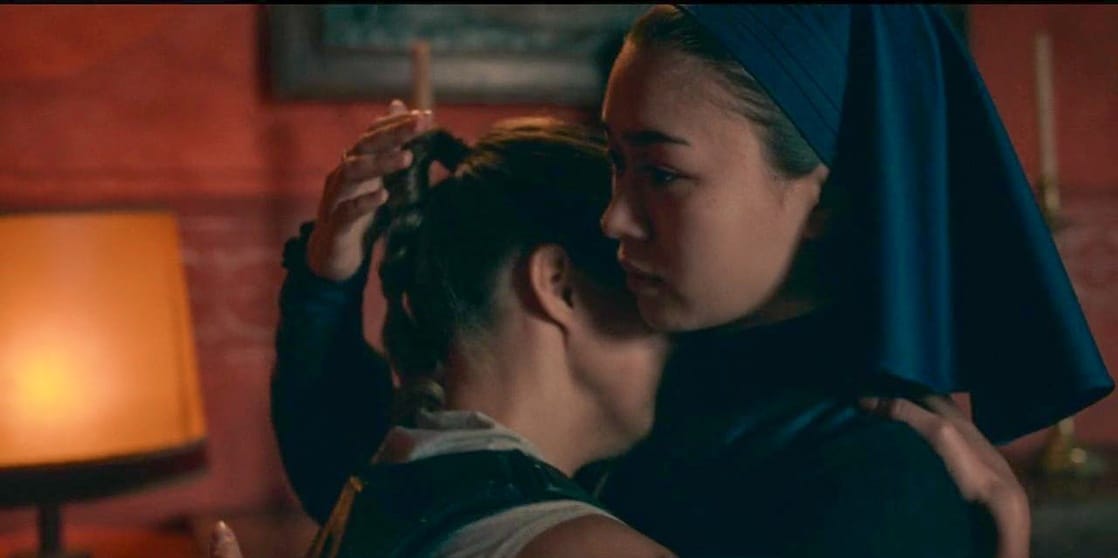
It’s been said before, but the Sister Warriors owe Ava an apology. Big time. And since Lilith has already apologized and begun to make amends, the biggest one owed now is by Beatrice.
Their first meeting is hardly a meet-cute. Beatrice literally attacks and drugs Ava. The sisters bring her to the OCS, change her clothes while she is unconscious and chain her to a bed. This is bad enough, but when you take into account the nature of Ava’s past trauma, it’s even worse.
It is notable that, like Vincent, Beatrice defends Ava’s right to live. When Ava wakes up, she can hear Lilith and Beatrice discussing her. It is Lilith pushing this conversation, and Beatrice literally stands between her and Ava: “The Halo chose her.” Regardless of the circumstances though, a debate about whether she gets to live is the first thing Ava hears upon her waking.
Yet when she first gets a chance to talk to Ava, the first thing Beatrice does is berate her.
“Life is coming at all of us right now. It might help things along if you didn’t treat everything like a joke.”
Beatrice to Ava, 1×03
It has been established that Beatrice treats Ava with significantly more empathy than most of the OCS, yet she is still parroting back the things she’s been taught. She’s qualifying Ava based on the dogma used to hurt and repress Beatrice herself, expecting Ava to fall in line, just like she did. This is pretty normal in the context of dogmatic religion, but that is no justification for it.
In order for Beatrice and Ava’s relationship to move forward, I believe this has to be acknowledged. Beatrice must recognize her behavior towards Ava as bad. What she did and said are a part of what pushed Ava away from the OCS. She physically assaulted her, and later guilted her for not wanting to be a part of the organization that ordered her forced detainment. No amount of trauma, no sense of duty excuses Beatrice’s actions.
That said, for Beatrice, to recognize this and apologize, implies to let go of significant beliefs that have defined her. Beliefs that affect not only how she sees Ava and others, but herself. To accept and repent for the harm she’s done while guided by duty motivated by religious dogma, she’d have to accept the harm it’s done to her as well.
This is why I think it makes sense, narratively, that Beatrice is not really ready to come face to face with her actions in season 1 (and before), or to acknowledge Ava’s pain yet. It opens the door to questions she’s not ready to answer.
Warrior Nun gives Ava space to breathe and consider her options, to come into the fold when she’s sure it’s the right thing, and that it’s what she wants. It stands to reason then, that Beatrice is also getting time to slowly evolve. Let us not forget that she’s having her entire worldview turned on its head. For those reasons, I do give season 1 a pass for not having Beatrice apologize to Ava yet.
The pass expires in season 2, though.
The Avatrice Factor
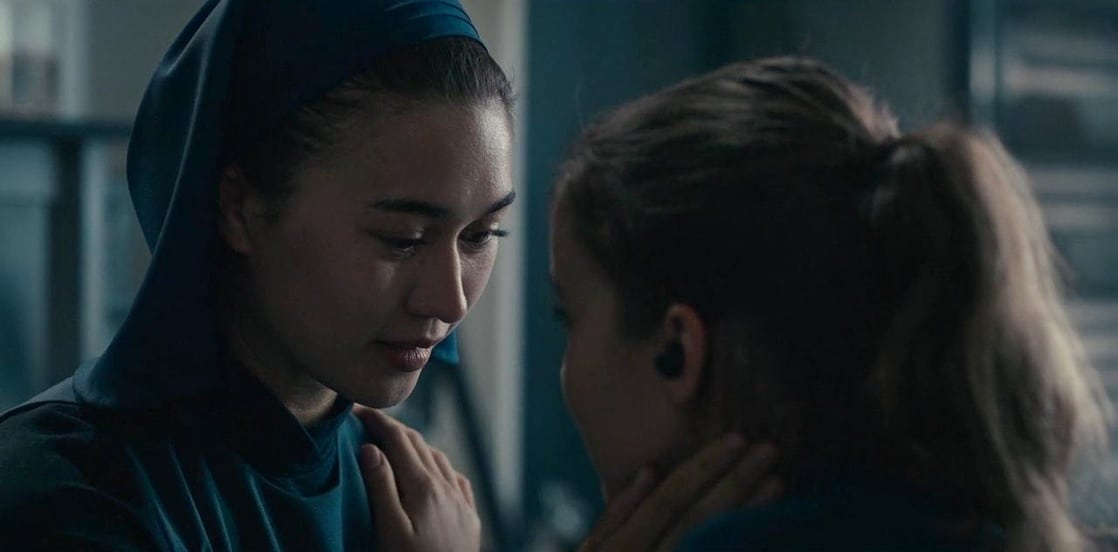
By the end of the season, it’s heavily implied that there is a romantic tension between Ava and Beatrice.
In episode 8, they read Sister Melanie’s diary together, and Beatrice comes out to Ava in a very emotional scene. She gets extremely defensive at first, and it’s only when Ava calls her out that she realizes how hurtful she’s being, and opens up.
Ava: “I’m sorry.”
Beatrice: “It’s not you. It was everyone but you.”
1×08
This last is an implication that Ava is perhaps the first person in a while with whom Beatrice feels comfortable disclosing this information.
Seeing as Beatrice has taken Ava under her wing, and made her and the mission her duty, the attraction between them will complicate things. She’s still guarded in many ways, and bound by her vows and her sense of duty.
In Part 1, I made allusions to the way the Catholic Church views homosexuality. The official stance considers homosexual acts immoral. According to the Human Rights Campaign, “while the Catholic Church does not consider ‘homosexual orientation’ sinful in and of itself, it does have a very negative attitude toward it.”
So, in theory, a queer person who remains celibate should be welcomed into the Church community. In practice, though, it’s more complicated than that. Among many other factors, because according to the Church, you can sin with your thoughts.
Let’s go back to the Confiteor, prayer which is said during the penitential act in every mass:
“I confess to God Almighty, before the whole company of heaven, and to you, my brothers and sisters, that I have sinned in thought, word, and deed; in what I have done and in what I have failed to do […]”
Confiteor
If a homosexual act is a sin, and you can sin with your thoughts, a homosexual thought is a sin. You might start to see how hard it can be for a queer person to feel welcomed, and truly at peace.
Beatrice having feelings for Ava is likely not going to be easy for her. It’ll be painful to manage, even harder to admit. It will challenge her sense of self. Plus, it’s likely to send her on a spiral of guilt.
“When you’re punished just for being different you begin to hate what you are. And what you love, what should make you happy, only brings you pain.”
Beatrice to Ava, 1×08
Beatrice feels ready to open up to Ava, but she still doesn’t say the words. Labels aren’t everything, but sometimes a person being able to voice their identity in those terms is part of accepting it.
“Don’t hate what you are. What you are is beautiful.”
Ava to Beatrice, 1×08
Just like Beatrice sees Ava through the lens she applies to her own life, Ava does the same in reverse. Sees Beatrice the way she sees herself, as someone in pain, looking for the answers. It’s fair to say this is the first time that Ava truly sees her.
Beatrice quickly changes the subject, and brings them back to task; this is as much as she’s willing to say at the moment. She has a lot of self-awareness. She sees the cracks in the institution, and has willfully ignored them, as discussed in Part 1. She also suggests a notion that she knows what she’s been taught about her sexuality might be incorrect.
“I became skilled at so many things just so I would still have value, despite my flaws.. or what I had been told was a flaw.”
Beatrice to Ava, 1×08
Religious indoctrination often takes deep root, though. Intellectually she might even know it’s not true, but that won’t stop her feeling that it’s wrong to be the way she is. That she needs to do penance to redeem herself. Or that what she might be starting to feel for Ava, she should not feel.
The groundwork is set for Ava and Beatrice to come together in a romantic way. However, if it does happen, it won’t be easy. Beatrice has already started to change, but the next part will likely be rough on her.
I said that Catholicism and queerness are not impossible to reconcile. One reason is that you can find communities with authority figures who are more accepting and willing to challenge the dogma. Often, however, what happens is that people embrace the faith, but distance themselves from the institution.
There is no way the Church as it exists today would support and embrace Beatrice pursuing a relationship with Ava if she were a civilian, but Beatrice is a Sister. If they are to be together, I see not path forward for Beatrice except to renounce her vows and leave the Church.
Breaking Vows
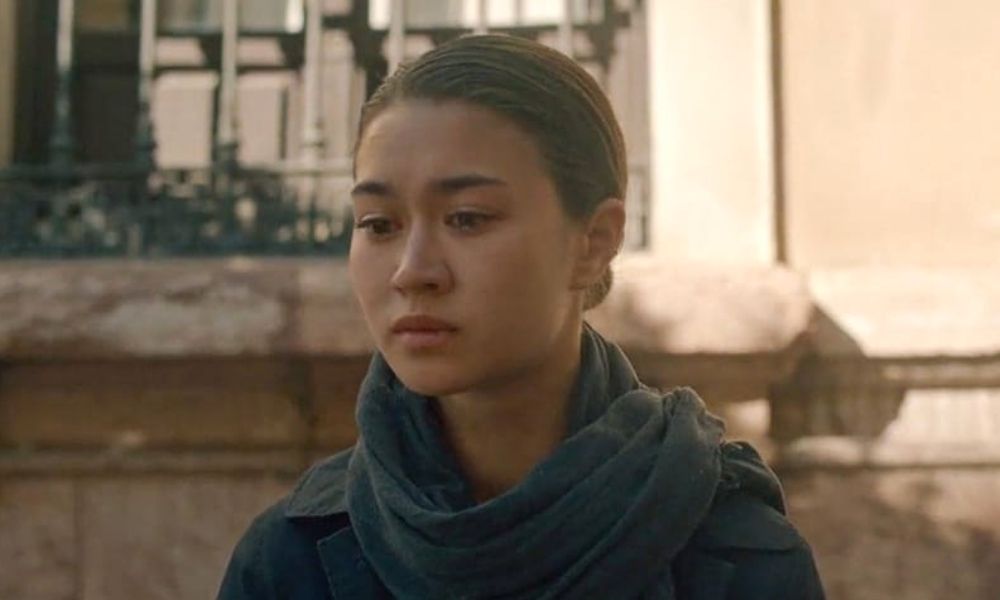
If my reading of her relationship with the Church holds up in future seasons, her renouncing her vows is frankly the best way to honor her character, and the journey so far hinted for her. But again leaving won’t be easy, and Beatrice might even face challenges after, if she does.
“[…] the phobia indoctrination in young childhood is so powerful, the fear of hell can last a lifetime despite rational analysis. Likewise the damage to self-esteem and basic self-trust can be crippling.”
-Marene Winell on RTS
The events of Season 1 already rocked Beatrice’s world. From Shannon’s murder to Duretti’s ambitious agenda, it all can’t have been easy for her. We still haven’t seen the effects that the revelations of Adriel and Vincent’s true nature will have.
Beatrice gave herself over completely to the OCS, and by the finale, its central deceit is exposed. It is based on a lie. Everything Beatrice, Lilith, Camila, Mary, Shannon and all the Warrior Nuns who came before have fought and died for is based on a lie.
The cracks that slowly bled during the first nine episodes burst wide open in the finale. It is going to be a rude, violent awakening for all. I am even a little nervous to see what that will look like for Beatrice.
Conclusion
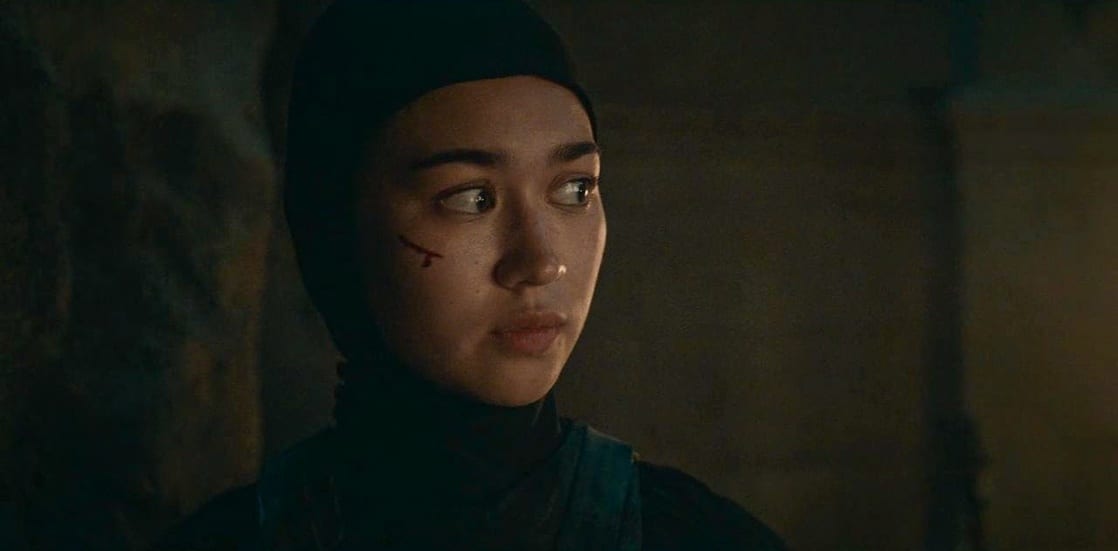
The groundwork is laid for a hell of a ride for all the Sister Warriors, and particularly Beatrice. She’s already started to shift her worldview, but there is still a long way to go.
I know this is not going to be my most popular take, but I think if the show is to do justice to Beatrice’s journey (and to Ava), it cannot rush Avatrice. Beatrice’s behavior towards Ava has to be addressed. Then, Beatrice needs to address her own trauma.
Still, it’s clear they’re going to go on the ride together. The choice Beatrice made at the end of episode 7 guarantees that she’ll have her sisters and Ava with her as her world continues to crash and burn.
I hope you enjoyed this peek into my unhinged brain. Who knows, I may be way off base here. The show might prove me wrong as it reveals more information about Beatrice’s past and family. I’ll be happy to find out more about her either way, and you can be damn sure I’ll overanalyze all the new information between seasons 2 and 3 (already manifesting).
Images courtesy of Netflix and RevelationEques of Listal
Have strong thoughts about this piece you need to share? Or maybe there’s something else on your mind you’re wanting to talk about with fellow Fandomentals? Head on over to our Community server to join in the conversation!

